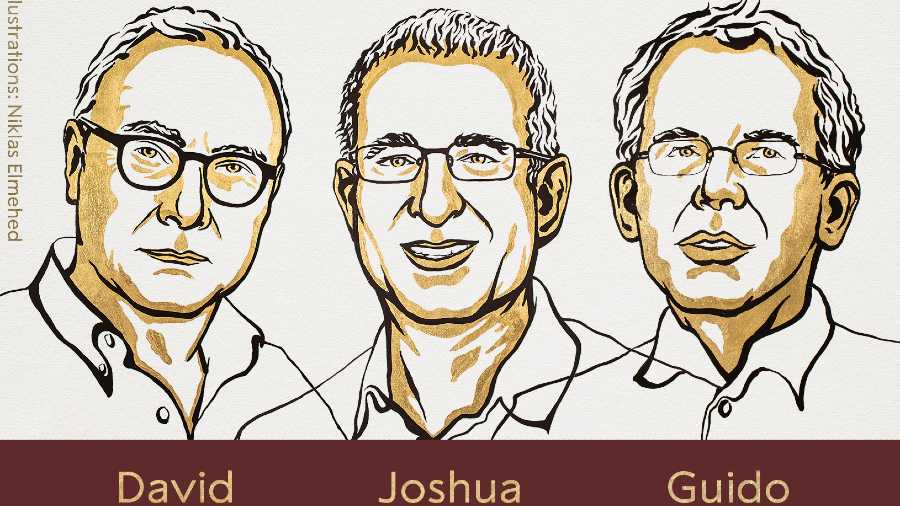A US-based economist won the Nobel prize for economics Monday for pioneering research that showed an increase in minimum wage does not lead to less hiring and immigrants do not lower pay for native-born workers, challenging commonly held ideas. Two others shared the award for creating a way to study these types of societal issues.
Canadian-born David Card of the University of California, Berkeley, was awarded one half of the prize for his research on how minimum wage, immigration and education affect the labour market, while the other half was shared by Joshua Angrist from the Massachusetts Institute of Technology and Dutch-born Guido Imbens from Stanford University for their framework for studying issues that can't rely on traditional scientific methods.
The Royal Swedish Academy of Sciences said the three have completely reshaped empirical work in the economic sciences.
Card's studies of core questions for society and Angrist and Imbens' methodological contributions have shown that natural experiments are a rich source of knowledge, said Peter Fredriksson, chair of the Economic Sciences Committee. Their research has substantially improved our ability to answer key causal questions, which has been of great benefit for society.
Card looked at what happened when New Jersey raised its minimum wage from 4.25 to 5.05, using restaurants in bordering eastern Pennsylvania as a comparison group.
Contrary to previous studies, he and his late research partner Alan Krueger found that an increase in the minimum wage had no effect on the number of employees. Card later did further work on the issue.
Overall, the research concluded that the negative effects of increasing the minimum wage are small and significantly smaller than believed 30 years ago, the Nobel committee said.
Card also found that incomes of those who are native born to a country can benefit from new immigrants, while immigrants who arrived earlier are the ones at risk of being negatively affected.
Angrist and Imbens won their half of the award for working out the methodological issues that allow economists to draw solid conclusions about cause and effect even where they cannot carry out studies according to strict scientific methods.
Speaking by phone from his home in Massachusetts, Imbens told reporters that he had been asleep after a busy weekend when the call came.
I was just absolutely stunned then to get a telephone call," he said.
And then I was just absolutely thrilled to hear the news ... that I got to share this with Josh Angrist and and David Card," whom he called "both very good friends of mine. Imbens said Angrist was best man at his wedding.
Krueger, who worked with Card on some of the research that won the Nobel, died in 2019 at age 58. He taught at Princeton for three decades and was chief US Labour Department economist under then-President Bill Clinton.
He served in the US Treasury Department under then-President Barack Obama, then as Obama's chairman of the Council of Economic Advisers.
Nobel prizes are not awarded posthumously.
The award comes with a gold medal and 10 million Swedish kronor (over 1.14 million).
Unlike the other Nobel prizes, the economics award wasn't established in the will of Alfred Nobel but by the Swedish central bank in his memory in 1968, with the first winner selected a year later.
It is the last prize announced each year.
Last week, the 2021 Nobel Peace Prize was awarded to journalists Maria Ressa of the Philippines and Dmitry Muratov of Russia for their fight for freedom of expression in countries where reporters have faced persistent attacks, harassment and even murder.
Ressa was the only woman honoured this year in any category.
The Nobel Prize for literature was awarded to UK-based Tanzanian writer Abdulrazak Gurnah, who was recognized for his uncompromising and compassionate penetration of the effects of colonialism and the fate of the refugee.
The prize for physiology or medicine went to Americans David Julius and Ardem Patapoutian for their discoveries into how the human body perceives temperature and touch.
Three scientists won the physics prize for work that found order in seeming disorder, helping to explain and predict complex forces of nature, including expanding our understanding of climate change.
Benjamin List and David W.C. MacMillan won the chemistry prize for finding an easier and environmentally cleaner way to build molecules that can be used to make compounds, including medicines and pesticides.











